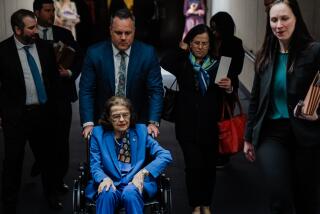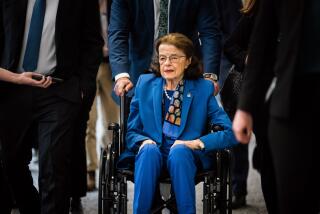Nixon Daughter Backs Estate
- Share via
Julie Nixon Eisenhower thinks the government should compensate her father’s estate for seizing his presidential papers and White House tapes, but she swore under oath that she and her sister would not be “personally enriched” by any financial settlement.
“It’s a total fiction that any money will come to my sister and me,” Eisenhower said, according to a transcript of her deposition with government lawyers, which was released Friday in Washington. “So not only will we not be personally enriched, but anything that comes in goes to the estate to pay taxes, attorneys’ fees, et cetera.”
During her deposition, Eisenhower she said she believes the privately run Richard Nixon Library & Birthplace Foundation in Yorba Linda needs to be funded like presidential libraries run by the National Archives.
Eisenhower, who lives near Philadelphia, traveled to Washington last week for a three-hour deposition in connection with a lawsuit over whether the government must pay millions to compensate the Nixon estate for confiscating more than 40 million pages of documents, 3,700 hours of secret tape recordings and thousands of photographs when he resigned in 1974.
Lawyers for the Justice Department and lawyers for the Nixon estate have been arguing the case since last December.
The government contends that, if anything must be paid to compensate the Nixon estate, a fair market value for the materials would be no more than $2.2 million. The Nixon estate places the value at $30million or more--and with interest, compensation could total $210 million.
The lawsuit was nearing its end when the Nixon estate sought to call Eisenhower as a rebuttal witness.
Justice Department lawyers accused the estate of prolonging the trial and trying to call a new witness under the guise of a rebuttal witness. U.S. District Judge John Garrett Penn agreed to let her testify but gave the government permission to depose her and seek some relevant documents.
Following her May 7 deposition, the government moved again to block Eisenhower’s testimony, saying she has little personal knowledge of her father’s plans for his presidential materials.
Before the judge had a chance to rule, the Nixon estate on Friday withdrew Eisenhower as a potential rebuttal witness. The estate’s lawyers said the government’s request for documents to prepare for her testimony outweighed her expected contribution to their case.
“The game at this point is not worth the candle,” the lawyers wrote.
Both Eisenhower and her sister, Tricia Nixon Cox, are heirs to their father’s estate. Eisenhower said proceeds from any court award would be used to pay legal bills and taxes and to help maintain and expand the library and foundation.
Her father “told Tricia and me on many, many occasions that he was continuing to fight the case because he wanted to be able to fund the library,” Eisenhower said. “He was consumed with worry the last year of his life, particularly about the library.”
Government attorney Neil Koslowe asked Eisenhower whether she recalled telling the director of the Nixon project at the National Archives that the lawsuit had to go forward because “otherwise the foundation would be broke.”
“I don’t recall using those words or saying that,” Eisenhower said. “I don’t recall saying it in that way, no. I’m sure that I expressed concerns that the library had a line of credit, which it still does, and that funds needed to be raised, and that there was just compensation due to fund a library.”
More to Read
Sign up for Essential California
The most important California stories and recommendations in your inbox every morning.
You may occasionally receive promotional content from the Los Angeles Times.













